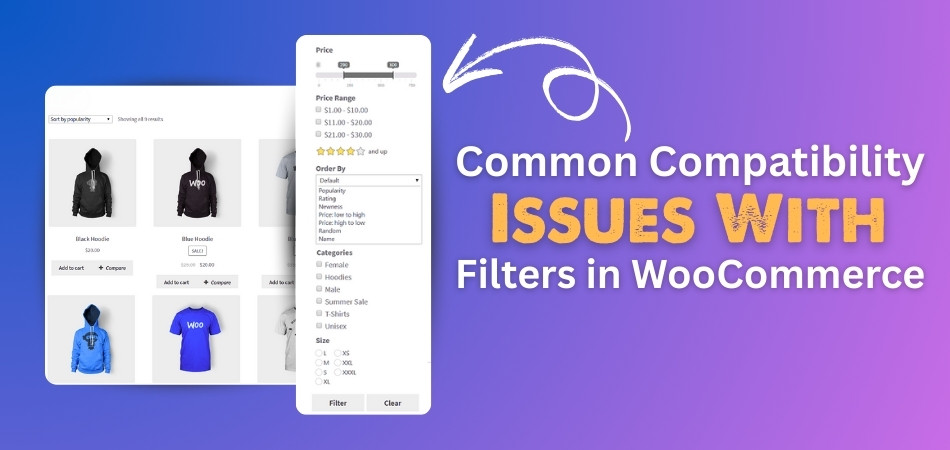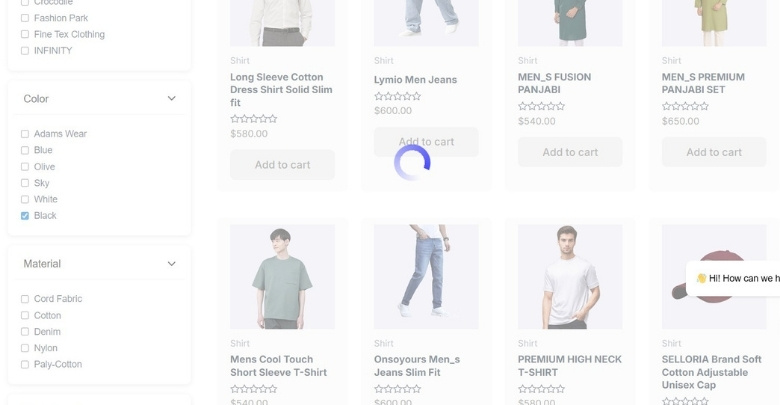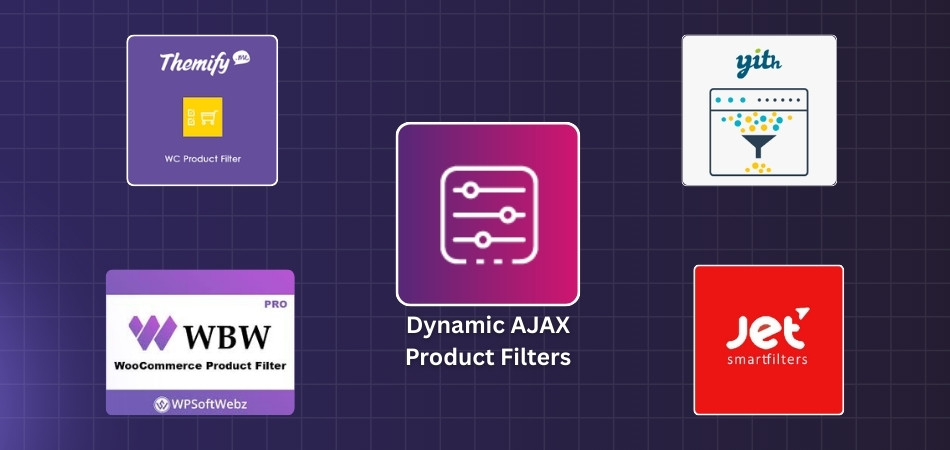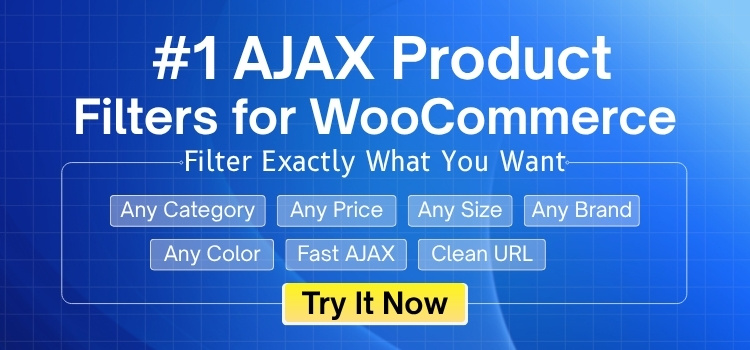WooCommerce filters make it easy for shoppers to narrow down products by things like price, color, or size. These filters are useful, but sometimes they don’t work as expected. If you’ve seen filters not showing or acting strange, you might be thinking, what are common compatibility issues with filters in WooCommerce?
The most common compatibility issues with WooCommerce filters include plugin and theme conflicts, missing or untranslated product attributes, wrong product counts, and problems with filter widgets not showing or displaying inconsistently. These issues usually come from AJAX conflicts, theme overwrites, page builder incompatibility, lack of product data, or errors in filter presentation.
Do you want to know why these problems happen and how you can fix them step by step? Then keep reading because this article covers everything you need to understand about WooCommerce filter issues and the best ways to solve them in detail.
What Are Common Compatibility Issues With Filters in WooCommerce?
When using product filters in WooCommerce, you may face some compatibility issues that affect how filters display or work. These issues often come from plugins, themes, or incorrect product settings. The following are the most typical issues and their fixes:

Plugin and Theme Conflicts
- Conflicts With AJAX: Some plugins use AJAX to update content on a page without reloading it. While this is useful for speed and user experience, it can clash with ajax product filters for woocommerce, causing filters to stop refreshing results, load empty products, or show outdated data.
- Theme Overwrites: Many themes come with custom code for styling and functionality. Sometimes, these themes override WooCommerce filter settings or template files. This can cause broken layouts, missing filter widgets, or filters that look fine but don’t actually work.
- Incompatibility of the Page Builder: Page builders like Elementor, WPBakery, or Divi allow you to design product pages with drag-and-drop tools. However, some filter plugins are not fully compatible with these builders. As a result, filters may not show on custom-built pages, or they may fail to interact with products correctly.
Problems With Products and Attributes
- Lack of Price Information: Price filters depend on accurate product price values. If a product doesn’t have a price or is marked “Out of Stock,” it may not appear in the filtered results. This can confuse customers because they may think the product doesn’t exist.
- Untranslated Attributes: For stores with multiple languages, filters rely on attributes like size, color, or material. If these attributes are not translated into all the languages, the filters may not show correctly. Customers switching to another language might see empty filter lists or broken filters.
- Product Count Errors: Filters often display the number of available products next to each category or attribute. If the count is wrong (for example, it says “10 products” but only shows 5), it usually means there’s a mismatch between how the plugin calculates products and how WooCommerce handles product visibility.
Issues With the Widget and Display
- Filters Not Shown: Sometimes the filter widget isn’t added to the sidebar or widget area. In other cases, filters only appear when there are products with matching attributes. If those attributes are missing, the filter disappears completely, making it look like it’s broken.
- Inconsistent Attribute Presentation: Attributes like size or color may appear in ways customers don’t understand. For example, a store might list shoe sizes as “10” and “10.0” separately, or show colors as text instead of swatches. This inconsistency makes filters harder to use and can lead to failed filtering.
How to Fix WooCommerce Filter Problems
When filters stop working, you can often fix the problem with a few simple checks. Here are the most common ways to troubleshoot and solve filter issues:
Step 1. Test With a Default Theme
Switching to a default WordPress theme like Storefront or Twenty Twenty helps you see if your current theme is the problem. If filters work fine with the default theme, then you know your main theme is causing the conflict.
Step 2. Deactivate Other Plugins
Sometimes another plugin interferes with how filters load. By deactivating all plugins except WooCommerce and the filter plugin, you can test if the issue goes away. Then, reactivate each plugin one by one to find the one causing the problem.
Step 3. Check for Theme/Plugin Updates
Outdated themes or plugins may not work well with the latest version of WooCommerce. Updating everything to the newest version often fixes known bugs and ensures better compatibility.
Step 4. Verify Product Attributes
Filters depend on correct product data. Make sure all your products have prices, stock status, and attributes (like size or color) set properly. If your store is in multiple languages, confirm that attributes are translated so filters work everywhere.
Step 5. Consult Plugin Documentation
Every filter plugin is slightly different. The documentation usually explains common issues, compatibility notes, and setup instructions for working with popular themes or page builders. Checking it can save time and give you plugin-specific solutions.
Do Translation Plugins Affect Filter Performance?
Yes, translation plugins can affect how product filters work in a WooCommerce store, especially if they are not fully compatible. Some filters may stop working or show wrong results when switching between languages. This usually happens when product attributes are not translated correctly. It can also cause missing products or broken filter options on translated pages.
Language plugins often create separate versions of content for each language, which can confuse some filter plugins. If filters depend on original product data, they might not detect translated versions. That’s why some translated filters don’t show all available items in the selected language. Setting up WooCommerce multilingual store filters properly is important to prevent these problems from showing up in your store.
To make filters work correctly, always choose translation plugins that are tested with your filter plugin. Also, check if all attributes like size, color, and price are translated. If you miss these steps, filters may not show up or behave as expected. Taking time to set things right will help avoid future filter issues.
AJAX Errors: How Do They Impact WooCommerce Filters?
WooCommerce filters can fail to work if AJAX errors occur. Such errors interrupt how products load and refresh on the site. Shoppers may then face delays, missing product results, or filters that freeze midway. Let’s explore the main effects more closely.

Slow Loading
One of the biggest signs of an AJAX error is when filters take too long to load results. Customers click on a filter, but the page seems stuck or delayed. This ruins the shopping experience and creates frustration. Slow filters often push customers away.
Empty Results
AJAX errors can sometimes make filters show no products at all, even when items exist. This happens because the data fails to load properly. Instead of showing matching products, the page appears empty. Customers may think the store has no stock.
Broken Refresh
Filters are supposed to refresh products smoothly without reloading the whole page. With AJAX errors, this process breaks down. Sometimes the products don’t update at all, or the page reloads incorrectly. This creates confusion and makes filters unreliable.
Wrong Product Counts
Another impact is wrong product counts showing beside categories or attributes. The filter might say “10 products,” but fewer items appear. This mismatch happens because AJAX fails to pull the correct data. Wrong counts lower customer trust in the store.
Widget Failures
AJAX errors may stop filter widgets from working altogether. Widgets may disappear, freeze, or fail to update when clicked. This makes it seem like the filters don’t exist. A broken widget is one of the clearest signs of AJAX trouble.
Random Behavior
Sometimes AJAX errors show up randomly, working fine one moment and failing the next. This inconsistency makes it hard to track the cause. Customers may leave the store thinking it is unreliable. Random errors are especially harmful during peak shopping times.
Theme Overrides That Remove Filter Functionality—Why Does It Happen?
Sometimes themes bring custom designs or layouts that look attractive but cause problems for WooCommerce filters. These issues can create confusion for store owners who rely on filters to help customers shop easily. Let’s look at why this happens and how you can handle it.
Template Conflicts
A lot of themes come with their own template files to control how products and pages appear. When these templates don’t fully match WooCommerce’s default structure, filters can stop working correctly. This mismatch can lead to filters not showing results or refreshing properly. It often happens because the filter plugin expects WooCommerce’s default setup, but the theme changes it in a way that causes conflict.
CSS and Scripts
Another reason filters may break comes from the extra CSS and scripts added by the theme. These are often used to change layouts, colors, or product display styles. But if they clash with filter scripts, you may see filters behaving strangely. For example, clicking a filter might reload the page incorrectly, or it may not update product lists at all. Such conflicts make filters appear unreliable.
Missing Support
Some themes do not officially support filter plugins, which means the integration is incomplete. In such cases, even if the filters show up, they might not function properly on category or shop pages. Many store owners face the issue of disappearing filters on WooCommerce themes, which usually happens when the theme overrides default WooCommerce templates or does not fully support filter plugins. This creates frustration for users and limits store usability.
Sidebar Problems
Filters often appear in the sidebar, but if the theme has a custom sidebar layout, problems can arise. A theme might disable sidebars on shop pages or only allow certain widgets. This limits where you can place filters. When filters do not appear where shoppers expect them, it reduces ease of use and can cause customers to leave the store without finding what they need.
Product Grid Issues
Some themes replace the default WooCommerce product grid with their own version. While this may look good visually, it can interfere with how filters load products. Instead of updating smoothly, filters may reload products incorrectly or display mismatched results. The custom grid may not recognize filtered queries, leaving customers with outdated product displays. This results in confusion and can affect sales.
Outdated Code
Older themes may not be updated to match the latest WooCommerce changes. When a filter plugin relies on new WooCommerce hooks or functions, outdated theme code fails to respond. This leads to filters showing errors or not appearing at all. Without proper updates, even small issues become bigger over time. Keeping themes updated is important to ensure filters continue to work with new WooCommerce versions.
Plugins That Improve the Performance of Your WooCommerce Store Filters
A good filter plugin can make product searches faster and easier for customers in any WooCommerce store. With the right plugin, you avoid common problems and keep everything running smoothly. Let’s look at some reliable options you can consider today.

Dynamic AJAX Product Filters
Dynamic AJAX Product Filters for WooCommerce is a powerful plugin that brings flexibility and smooth performance. It is built to handle different filtering needs while keeping the page fast and user-friendly. It also works well with popular page builders.
Core Features:
- AJAX Filtering, Pagination, and Sorting
- Filter by Price, Rating, Category, Tags & Attributes
- Multiple Filtering Methods
- Shortcode Compatibility
- Built-in Dynamic AJAX Filter Widget & Block
- Filter Visibility Control
- Different Filters for Different Pages
- Ready for Use on Mobile Devices
- Customizable Loader
YITH AJAX Filters
YITH AJAX Product Filter is known for its clean design and smooth filtering. It helps customers find what they need quickly without page reloads. The plugin is also easy to set up and works well with WooCommerce stores of all sizes.
Features:
- Live AJAX filtering for attributes, price, categories, and tags
- Different filter layouts, such as checkboxes and dropdowns
- Lightweight design that doesn’t slow down your store
- Compatible with many WooCommerce themes
- Easy customization options for store owners
JetSmartFilters
JetSmartFilters is perfect for stores using Elementor or other page builders. It comes with a wide choice of filter types, giving full control over design and usability. It’s designed to handle advanced product layouts smoothly.
Features:
- Works smoohtly with Elementor and Gutenberg
- Filter styles like checkboxes, dropdowns, and range sliders
- Supports hierarchical filtering for categories and tags
- Compatible with WooCommerce and JetEngine listings
- Easy integration into custom pages and layouts
Themify Product Filter
Themify’s plugin is lightweight, simple, and customizable. It works quickly across different store types and themes. It’s also user-friendly, making it a good choice for beginners.
Features:
- Filter by price, attributes, tags, and categories
- Live search and instant product updates
- Customizable layouts to match store design
- Responsive design for mobile users
- Easy to install and configure
Product Filter by WooBeWoo
WooBeWoo’s plugin is both stylish and functional. It offers drag-and-drop filter building, making setup fast and simple. The filters look professional and work smoothly across different devices.
Core Features:
- Filtering by price, rating, categories, attributes, and tags
- Drag-and-drop builder for easy setup
- Ready-made filter designs for quick use
- Mobile-friendly and responsive filters
- Integration with WooCommerce shortcodes and widgets
When to Seek Developer Support for Solving WooCommerce Filters Issues?
Sometimes WooCommerce filters stop working in ways that basic fixes cannot solve. These cases often need deeper technical knowledge to fix properly without breaking other parts of the store. Let’s look at when developer support becomes the best option.
Complex Plugin Conflicts
When multiple plugins clash, it can be very hard to find the exact cause. A developer can trace the issue in the code and make sure filters and other plugins work together. This saves time compared to endless testing. Professional fixes also reduce the chance of new errors.
Theme Customization Problems
Many store themes have custom functions that may block or break filters. Developers know how to check template files and make safe adjustments. Instead of removing useful theme features, they adjust the code to allow filters to work. This keeps both design and function in balance.
Page Builder Errors
Page builders like Elementor or Divi sometimes cause filters to fail on custom pages. Developers can identify the conflict between the builder and the filter plugin. They can also add custom code or settings to make them work together. This ensures smooth use of filters across the site.
Server and Database Issues
Filters depend on correct data from the database and a smooth server response. If errors appear in queries or the server struggles, filters may not load results. A developer can optimize queries or fix server setups. This keeps your filters fast and reliable.
Custom Filter Needs
Sometimes, default filter plugins don’t provide the exact features your store needs. Developers can create custom filters or extend existing ones. This includes adding unique styles, advanced rules, or better product sorting. Custom solutions make filters work perfectly for your store setup.
Security and Stability
Trying random fixes can sometimes break important store functions or cause security issues. Developers know how to apply changes safely. They can also test filters in a secure way before applying fixes live. This ensures stability while solving the problem.
Frequently Asked Questions
WooCommerce filters are an important part of any online store because they help customers find products easily. But they can sometimes run into unexpected issues that affect performance and usability. Below are some common questions store owners often ask, with clear answers to help you understand filter compatibility better.
Why Do Filters Not Work on Mobile Devices?
Filters may behave differently on mobile devices due to responsive design settings in themes. Some themes hide or compress widgets to save space, which can make filters hard to find or use. Developers sometimes need to adjust CSS or mobile layouts so filters remain visible and functional.
Can WooCommerce Caching Plugins Break Filters?
Yes, caching plugins can interfere with filter performance because they serve stored versions of pages instead of live data. This can stop filters from updating products correctly. To avoid this, caching plugins must be configured to exclude AJAX requests and WooCommerce shop pages.
Why Do Filters Stop Working After WooCommerce Updates?
After major WooCommerce updates, filter plugins may temporarily stop working if they rely on old functions or hooks. This usually happens when the plugin developer has not released a compatibility update yet. Updating both WooCommerce and the filter plugin usually resolves the issue quickly.
How Do Filters Handle Variable Products?
Filters sometimes struggle with variable products because each variation has its own attributes. If the plugin does not read variations correctly, some options may not appear in filters. Using a plugin that supports smart filtering for variations helps avoid missing product options.
Do Filters Affect Store Speed?
Yes, poorly optimized filters can slow down a store, especially when handling many products. Heavy queries, multiple AJAX calls, or unoptimized databases can cause delays. Choosing lightweight filter plugins and optimizing product data can improve speed while keeping filters functional.
Do Filters Work With WooCommerce Shortcodes?
Not all filter plugins support WooCommerce shortcodes. If a page is built using shortcodes, filters may not apply correctly. Choosing a filter plugin with shortcode compatibility ensures products update smoothly even on non-standard shop pages.
Why Do Filters Fail on Category Pages Only?
Sometimes filters work fine on shop pages but fail on category-specific pages. This usually happens due to custom category templates or missing hooks. Updating category templates to match WooCommerce defaults often solves this inconsistency.
Can Too Many Filters Confuse Customers?
Yes, adding too many filter options can overwhelm customers and reduce usability. Instead of helping, it may slow down shopping and cause higher bounce rates. Keeping filters clear, simple, and relevant improves both customer experience and store performance.
Bottom Line
WooCommerce filters play a big role in helping customers shop with ease, but they can also be a source of frustration when they stop working. From AJAX errors to theme conflicts, even small issues can affect the overall shopping experience.
Understanding what are common compatibility issues with filters in WooCommerce gives store owners the knowledge to fix problems faster and keep their shops running smoothly. Simple checks like testing themes, updating plugins, and verifying attributes often solve most filter troubles without much effort.
If problems continue, professional support or advanced plugins can provide a reliable solution. By staying proactive and prepared, you can make sure filters always work the way customers expect and keep your WooCommerce store easy, smooth, and trustworthy.
